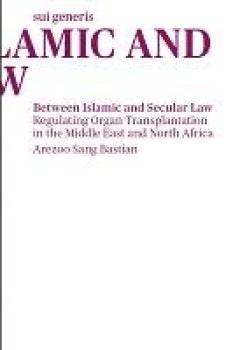Filter by

Between Islamic and Secular Law
When describing the legal systems and laws of today’s Muslim-majority states in the Middle Eastern and North African (MENA) region, scholarship on Islamic law has identified two categories of laws: one derived from Islamic law, which includes contemporary personal status laws, and the other derived from non-Islamic law of primarily European origin, referring to all other legal fields.
- Edition
- -
- ISBN/ISSN
- 10.38107/052
- Collation
- 196
- Series Title
- -
- Call Number
- -

Unfree Lives : Slaves at the Najahid and Rasulid Courts of Yemen
Unfree Lives illuminates Yemen’s forgotten history of slavery, as well as the transregional dimensions of slave trading in the Red Sea and wider Indian Ocean world. By analyzing Arabic narrative and administrative sources, Magdalena Moorthy Kloss reconstructs the lives of women and men who were trafficked to Yemen as children and then placed in various subaltern positions — from domestic se…
- Edition
- -
- ISBN/ISSN
- 9789004693784
- Collation
- 248 hlm; ill., lamp.,
- Series Title
- Studies in Global Slavery, Volume: 16
- Call Number
- -

Women Judges in the Muslim World = A Comparative Study of Discourse and Practice
Women Judges in the Muslim World: A Comparative Study of Discourse and Practice fills a gap in academic scholarship by examining public debates and judicial practices surrounding the performance of women as judges in eight Muslim-majority countries (Indonesia, Malaysia, Pakistan, Syria, Egypt, Libya, Tunisia and Morocco). Gender, class, and ethnic biases are inscribed in laws, particularly in t…
- Edition
- -
- ISBN/ISSN
- 9789004342200
- Collation
- 346 hlm; ill., lamp.,
- Series Title
- Women and Gender: The Middle East and the Islamic World, Volume: 15
- Call Number
- -

Visions of Justice : Sharīʿa and Cultural Change in Russian Central Asia
Visions of Justice offers an exploration of legal consciousness among the Muslim communities of Central Asia from the end of the eighteenth century through the fall of the Russian Empire. Paolo Sartori surveys how colonialism affected the way in which Muslims formulated their convictions about entitlements and became exposed to different notions of morality. Situating his work within a range of…
- Edition
- -
- ISBN/ISSN
- '9789004330900
- Collation
- 408 hlm; ill., lamp.,
- Series Title
- Handbook of Oriental Studies. Section 8 Uralic & Central Asian Studies,
- Call Number
- -

Religious Minorities in the Middle East : Domination, Self-Empowerment, Accom…
The relationship between religious majorities and minorities in the Middle East is often construed as one of domination versus powerlessness. While this may indeed be the case, to claim that this is only or always so is to give a simplified..
- Edition
- -
- ISBN/ISSN
- 978-90-04-21684-6
- Collation
- -
- Series Title
- -
- Call Number
- -

Europe’s Islamic Legacy: 1900 to the Present
Seven new scholarly essays present original research that includes rare historical and photographic materials highlighting the significance of Islamic civilization and its vexed legacy in a variety of contemporary European countries and challenging the perception of European identity as exclusively Christian. This volume unearths a rich, complex history of relationships between Muslims and Chri…
- Edition
- -
- ISBN/ISSN
- 978-90-04-51072-2
- Collation
- oer.unej.ac.id
- Series Title
- -
- Call Number
- -

End-of-Life Care, Dying and Death in the Islamic Moral Tradition
Modern biomedical technologies managed to revolutionise the End-of-Life Care (EoLC) in many aspects. The dying process can now be “engineered” by managing the accompanying physical symptoms or by “prolonging/hastening” death itself. Such interventions questioned and problematised long-established understandings of key moral concepts, such as good life, quality of life, pain, suffering, …
- Edition
- -
- ISBN/ISSN
- 978-90-04-45941-0
- Collation
- oer.unej.ac.id
- Series Title
- Studies in Islamic Ethics, Volume: 4
- Call Number
- -

Kurdish Studies Archive : Vol. 1 No. 1 2013
Kurdish Studies Archive publishes the content of volumes 1 to 10 of Kurdish Studies. This interdisciplinary and peer-reviewed journal was dedicated to publishing high-quality research and scholarship. Since 2023 the journal has been continued as the new Kurdish Studies Journal, published by Brill, and focuses on research, scholarship, and debates in the field of Kurdish studies in a multidiscip…
- Edition
- -
- ISBN/ISSN
- 978-90-04-70056-7
- Collation
- -
- Series Title
- -
- Call Number
- -

Kurdish Studies Archive : Vol. 7 No. 1 2019
Kurdish Studies Archive publishes the content of volumes 1 to 10 of Kurdish Studies. This interdisciplinary and peer-reviewed journal was dedicated to publishing high-quality research and scholarship. Since 2023 the journal has been continued as the new Kurdish Studies Journal, published by Brill, and focuses on research, scholarship, and debates in the field of Kurdish studies in a multidiscip…
- Edition
- -
- ISBN/ISSN
- 978-90-04-70848-8
- Collation
- -
- Series Title
- -
- Call Number
- -

Kurdish Studies Archive : Vol. 10 No. 1 2022
Kurdish Studies Archive publishes the content of volumes 1 to 10 of Kurdish Studies. This interdisciplinary and peer-reviewed journal was dedicated to publishing high-quality research and scholarship. Since 2023 the journal has been continued as the new Kurdish Studies Journal, published by Brill, and focuses on research, scholarship, and debates in the field of Kurdish studies in a multidiscip…
- Edition
- -
- ISBN/ISSN
- 978-90-04-72623-9
- Collation
- -
- Series Title
- -
- Call Number
- -
 Computer Science, Information & General Works
Computer Science, Information & General Works  Philosophy & Psychology
Philosophy & Psychology  Religion
Religion  Social Sciences
Social Sciences  Language
Language  Pure Science
Pure Science  Applied Sciences
Applied Sciences  Art & Recreation
Art & Recreation  Literature
Literature  History & Geography
History & Geography